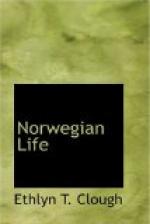The king is the head of the established church, which is the Lutheran. He is also commander-in-chief of the army and navy, but can not increase or decrease the military establishment without the approval of the parliament. He has the right to declare war and conclude peace, but can not expend money for military purposes, not even for the national defense, without the consent of the legislature. The Norwegian constitution is silent concerning his authority to conclude treaties with foreign powers, and the question has never been raised. He conducts negotiations through his ministers and submits the result of their labors for the approval of parliament. He has the power to suspend the collection of customs duties temporarily until the parliament can meet to consider the matter, but it has very rarely been exercised.
The parliament is called the storthing, and is composed of one hundred and fourteen representatives, thirty-eight from the towns and seventy-six from the rural districts. It divides itself into two sections, known as the odelsthing and the lagthing. The members are elected for three years by an indirect and complicated system which is nearly the reverse of our own. The voters of each parish, which forms an election district, assemble at a given place and time and select delegates to a convention which chooses their representatives in the storthing, and, when the storthing meets, its one hundred and fourteen members select one-fourth of their own members, generally the most experienced and distinguished men, to constitute a senate, or upper chamber, called the lagthing, which exercises a sort of supervisory power over legislation.
The storthing sits for about six months every year. The members are paid $3 a day during the session and their traveling expenses. The presiding officer is chosen every four weeks, and can not succeed himself without an interval. The committees are appointed by a “selection committee” elected by ballot, and each committee chooses his own chairman. There is a rather novel rule requiring bills referred to committees to be assigned for consideration to the several members in rotation. Any member may introduce a bill modifying the constitution, but all other classes or measures must proceed from the government and the members of the lower house. Members of the upper house, or lagthing, are not permitted to propose ordinary legislation, on the theory that they should remain unprejudiced so as to exercise a judicial revision. Thus, bills must originate in the odelsthing, which, having passed them, sends them to the lagthing for its approval.
The financial officers of the government and the directors of the national bank are elected by the storthing, which appoints a committee every six months to revise and audit the accounts of officials who have to do with the disbursement or collection of money. When an irregularity or improper expenditure is discovered, the legislature is asked to decide whether the minister in charge of the department shall repay the sum from his own pocket and repair the damage that has been caused by one of his subordinates.




